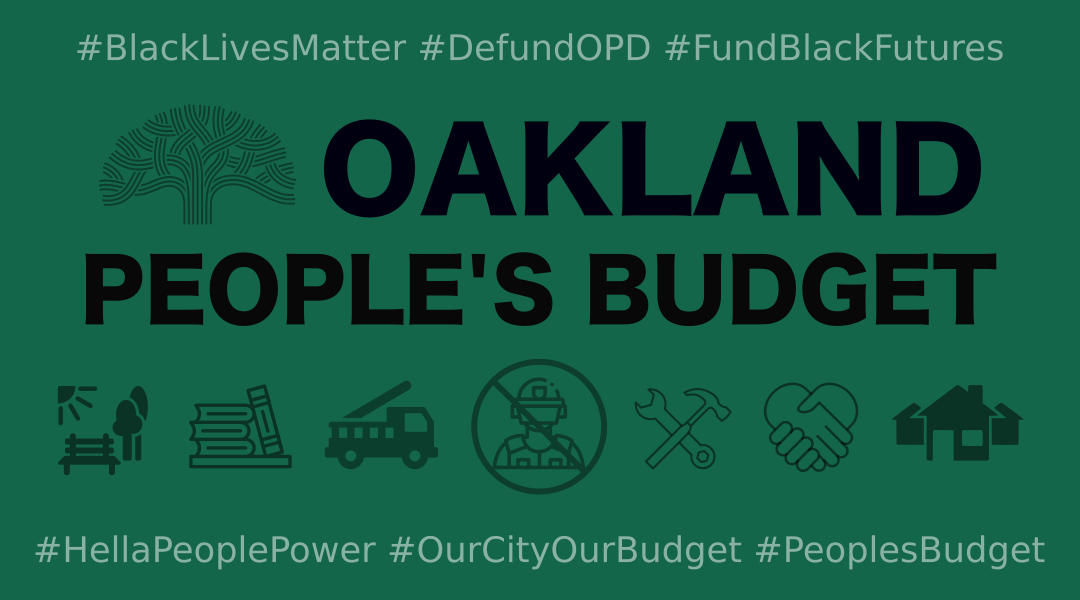This week we made the People’s Budget Survey public and started gathering feedback. This post explores some of the decisions and history behind the project.
A New Format
This survey is inspired by the budget assembly workshops and street outreach work done by our friends in the Community Democracy Project, who we helped gather signatures for last year. Through thousands of conversations with folks from West Oakland to Rockridge to Eastmont we heard a range of perspectives on what the city’s priorities should be. Due to COVID-19 face-to-face outreach is not possible so we decided to help out by making an online platform.
Timing
The idea for a People’s Budget survey has been floating around for years. Recent amplification of calls to #DefundOPD and reinvest in community after George Floyd’s murder are calling new attention to city budgets. Meanwhile Oakland is adopting adjustments to its budget due on June 30th. This intense and urgent situation – in addition to our individual experiences with institutional racism, working essential jobs through a pandemic, or being tear-gassed at protests – motivated us to release the survey as soon as possible.
Defunding the Police
Outreach and budget assemblies demonstrated the types of programs folks want to invest more in: housing, youth programs, violence prevention, illegal dumping cleanup, and fixing potholes to name a few. Even those whose main concern was public safety were surprised to learn that policing receives ~45% of the budget’s general fund (~$306 million) and thought that there were better ways to use those resources. We saw broad consensus for defunding the police by at least 50% in favor of funding community programs with more direct positive impacts on the neighborhood.
Why the General Fund?
One of the first decisions when analyzing a city’s budget is whether to look at the total budget or only general funds. General funds make up ~41% of Oakland’s budget and are currently decided by the mayor and city council; the rest are special funds from sources like Measure KK or state grants which are supposed to be used for specific purposes. Some departments primarily receive special funds (transportation, public works) while others rely more on general funds (city administration, police).
This survey focuses on the general fund. Reasons include:
- City council has an upcoming deadline (June 30) to make budget adjustments, including over $38 million in cuts to the general fund due to COVID-19. This should be informed by community priorities.
-
Other organizations are emphasizing general fund statistics, such as 44% going to the police. We want to be consistent with the broader conversation and avoid confusion. For completeness, a chart showing the total budget allocation is included on both the survey and results page.
-
Debt Servicing is a large part of the total budget, mostly due to pension obligations. In past workshops people were instructed not to change its amount. We encourage folks to be aware of the role debt plays in Oakland’s budget, but for the purpose of the survey it restricts creativity and can be discouraging.
-
CDP’s People’s Budget Amendment gives all Oakland residents an equal vote on how to allocate general funds. The amendment handles special purpose funds through a separate process called Citywide Committees. Our survey more closely mirrors the format of their general fund vote.
What next?
We hope the survey is a learning experience and inspires you to imagine what Oakland could look like with participatory budgeting.
In the short term, we’d like as many Oaklanders as possible to participate by June 30th so we can show our city what a People’s Budget looks like! Take the survey today and share it with friends, family, and your city council member. Our goal is for at least 1,000 people to take this survey by the end of June and we need #HellaPeoplePower to get there.
In the long term, C4C envisions participatory budgeting as a tool for building collective wisdom and empowering people to make decisions that impact their daily lives. We look forward to collecting signatures for the People’s Budget Amendment again and encourage you to join, endorse, or donate to the Community Democracy Project.


0 Comentarios